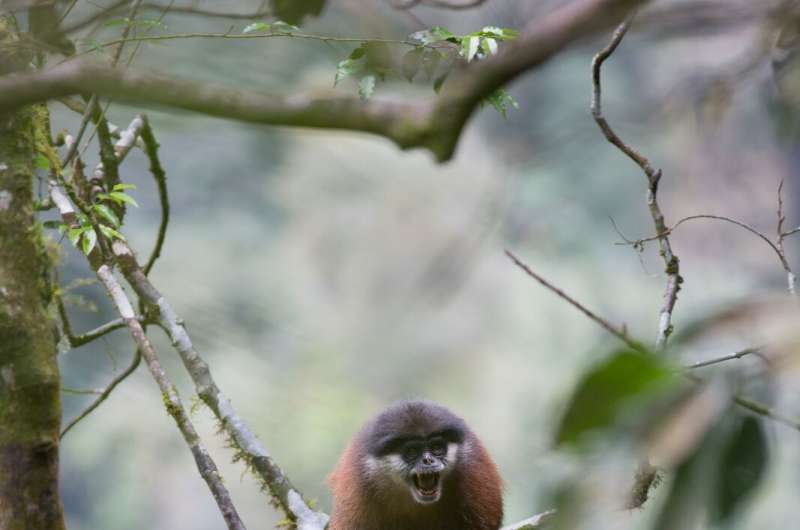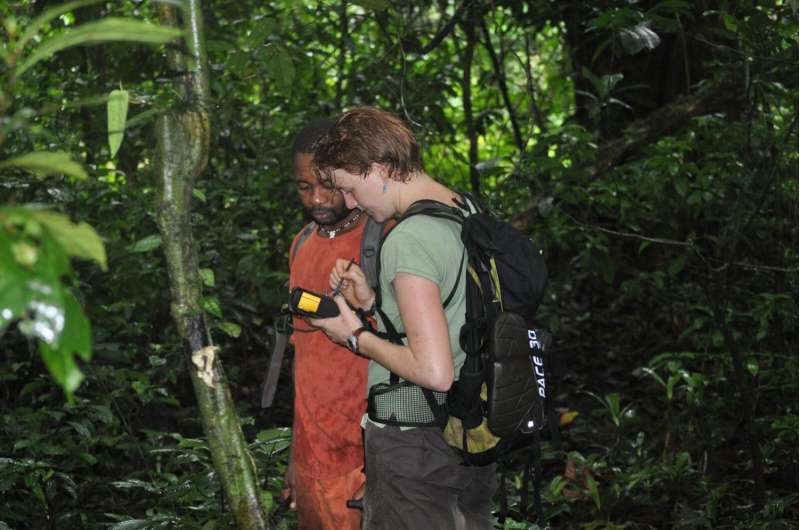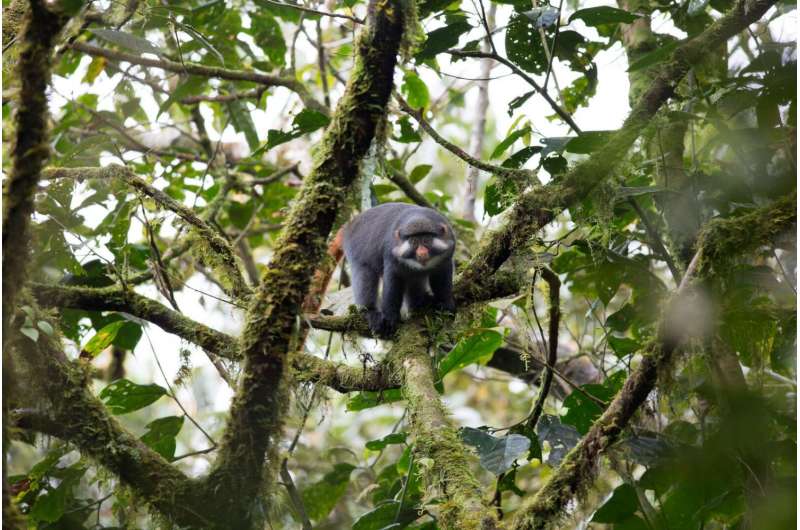Gun hunting could lead to extinction of threatened primates on African island

Gun hunting may be driving some of the most threatened primates toward extinction on Bioko Island off the coast of Africa, according to a new study by a team led by Drexel University researchers.
The research team found that as evidence of gun hunting increased, the abundance of the seven monkey species found on Bioko Island fell. Four of those species were determined to be especially vulnerable and unable to adapt to hunting.
Featuring scientists from the Bioko Biodiversity Protection Program, a joint venture between Drexel's College of Arts and Sciences and the National University of Equatorial Guinea, this study—published in Biological Conservation as "Impact of gun-hunting on monkey species and implications for primate conservation on Bioko Island, Equatorial Guinea"—comes on the heels of findings that bushmeat sales in the region markedly increased over the last two decades. Bushmeat is meat hunted from the wild, which can include primates.
"Ecologically, primates are key seed dispersers responsible for the maintenance of Bioko's forests," said Drew Cronin, PhD, a postdoctoral research fellow in the lab of Mary Katherine Gonder, Ph.D., the Drexel associate professor serving as director of the Bioko Biodiversity Protection Program. "In hunted forests, where animals like primates have been hunted out, there have been negative cascading ecological effects and large scale changes to forest structure."

Bioko Island is a part of Equatorial Guinea and lies off the coast of Cameroon in the Gulf of Guinea. A critical site for many endangered species, including primates, the island is considered a biodiversity gem.
"Bioko's monkeys are also a real national treasure: Think of the iconic fauna in the U.S., like the bison or the bald eagle, and the national identity that those species lend to the population," Cronin said. "Bioko's monkeys are its most charismatic species and can be flagships for conservation in the country."
However, Equatorial Guinea's government has not effectively enforced hunting bans on the island. And as more roads are constructed, areas previously inaccessible to hunters are becoming exposed.
One region, Belebu, which was accessible by vehicle, averaged 2.89 signs of gun hunting per kilometer (instances could be as small as spent shotgun shells or discarded batteries to as large as hunting camp). Monkey sightings there averaged just 0.18 groups per kilometer. That's compared with Ureca, which at the time of the study was 22 kilometers from the closest road, where the next lowest figures, an average of 1.82 primate sighting per kilometer were observed. Those numbers correlated with a much lower hunting presence—just 0.29 signs of gun hunting per kilometer.
The researchers found that two species, the red-eared monkey (Cercopithecus erythrotis) and putty-nosed monkey (Cercopithecus nicitans), were somewhat tolerant of heavy hunting. Potential reasons for their tolerance may be behavioral changes, such as vocalizing less or becoming more cryptic, according to the study.

Although those two species fared better when faced with heavy hunting, four other monkeys were found to be significantly vulnerable. The Bioko drill monkey (Mandrillus leucophaeus), crowned guenon (Cercopithecus pogonias), black colobus (Colobus satanas) and Pennant's red colobus (Procolobus pennantii) all appeared unable to cope with the hunting threat.
For example, Pennant's red colobus—which scored the worst on the Hunting Response Index created by the researchers—is more specialized and only able to thrive in certain environments. Its larger relative body and group sizes also impacted the red colobus negatively when it came to hunters.
A combination of these factors—bigger body/group sizes and a more specialized niche—seems to have combined to make red colobus so vulnerable to gun hunting that they are likely gone from large portions of Bioko Island.
In light of what they found, the researchers suggested two routes to conservation on the island: a long-term and a short-term plan.
The long-term solution would involve developing a comprehensive management plan for the Gran Caldera Scientific Reserve, the island's 130,000 acre preserve. Such a plan would require significant governmental and financial commitment.
Short-term or "stop-gap" measures could include the immediate implementation of a system of forest guards in particularly troubled areas. Effectively enforcing laws already on the books against poaching would also be an important short-term measure. This could be done relatively easily by military already present throughout the island conducting road-side enforcement.
But, in the end, political will is the strongest and most effective tool for conservation.
"We haven't yet reached the tipping point, but we believe it's achievable," Cronin said. "We have been gaining a lot of momentum in recent years and there are more and more capable people getting engaged in the culture of conservation that we're advocating. If we are successful in in convincing a few of the 'right' people, we'll take some big steps forward."
If the government's attention is not turned to Bioko's wildlife soon, the extermination of several species on the island, including the endemic red colobus, could be not far down the line.
"It is incredibly important to protect these species from hunting and other threats," Cronin said. "Bioko's primates are largely endemic to the island, and even those that are also found on the mainland are endemic only to the region, which means they're not widespread. If we don't protect them on Bioko, they may be lost forever."
More information: Drew T. Cronin, Impact of gun-hunting on monkey species and implications for primate conservation on Bioko Island, Equatorial Guinea, Biological Conservation (2016). DOI: 10.1016/j.biocon.2016.03.001
Journal information: Biological Conservation
Provided by Drexel University





















